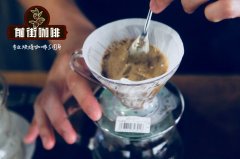Franci Learn more about Franci
-
Introduction of Rosa Coffee Ye Jia Xuefei Coffee tastes different

For the exchange of professional baristas, please follow the coffee workshop (Wechat official account cafe_style) Rose Summer Coffee: the species of Geisha was discovered in the rose forest of Ethiopia in 1931 and sent to the Coffee Research Institute in Kenya; it was introduced to Uganda and Tanzania in 1936, Costa Rica in 1953, and Panama by Franci from the seven agricultural gardens in Dongba in the 1970s.
2018-12-18 Rose Summer Coffee introduction Yega Chevy Taste difference Specialty Communication -
Introduction of Manor Flavor in Panamanian Coffee Bean producing area Esmeralda Manor Panamanian Coffee Manor

The species of LaEsmeralda "Geisha" was discovered in the rose summer forest of Ethiopia in 1931 and sent to the Coffee Research Institute in Kenya; it was introduced to Uganda and Tanzania in 1936, in Costa Rica in 1953, and Panama was started in the 1970s by Mr. Franci Coselazin of Dongba Seven Farm Garden from CATIE in Costa Rica.
2016-07-18 Panama coffee beans producing areas manors flavors introductions ace Mela coffee -
Columbia Linglong Coffee Bean Flavor _ St. Francis San Francisco Coffee Manor Information

Professional coffee knowledge exchange more coffee bean information please follow the coffee workshop (Wechat official account cafe_style) Columbia Yana exquisite Supremo San Francisco Manor ● owner: in 1975, Luis Guillermo Posada bought a small farmer in Concordia, Antioquia.
2018-09-20 Columbia Linglong coffee beans flavor Francis San Franci -
Panamanian Coffee Manor introduces Esmeralda Manor

The species of "LaEsmeralda" manor Geisha was discovered in the rose summer forest of Ethiopia in 1931 and sent to the Coffee Research Institute in Kenya; it was introduced to Uganda and Tanzania in 1936, in Costa Rica in 1953, and Panama was started in the 1970s by Mr. Franci Coselazin of Dongba Seven Farm Garden from CATIE in Costa Rica.
2016-07-12 Panama Coffee Manor producing area introduction Ace Mela LaEsmera -
Panamanian Cupid Coffee Flavor description Variety characteristics introduction of Fine Coffee Bean taste Grinding degree

Species of Geisha were discovered in the Rose Summer Forest of Ethiopia in 1931 and sent to the Coffee Institute in Kenya, introduced to Uganda and Tanzania in 1936, introduced to Costa Rica in 1953, and Panama was collected in the 1970s by Mr. Franci Coselazin of the Dongba Seven Farm Garden from CATIE in Costa Rica and began to grow Rose Summer Coffee. Gei
2016-09-30 Panama Cupid coffee flavor description variety characteristics boutique coffee beans -
Panamanian Kasha Coffee Flavor and taste introduction to boutique coffee beans in the manor area

The species of Geisha was found in the rose summer forest of Ethiopia in 1931 and then sent to the Coffee Research Institute in Kenya; it was introduced to Uganda and Tanzania in 1936, in Costa Rica in 1953, and Panama was collected by Mr. Franci Coselazin of Dongba Seven Farm Garden in the 1970s from CATIE in Costa Rica and began to grow.
2016-09-14 Bana Marca coffee flavor taste manor producing area characteristics boutique coffee beans -
What is the F1 hybrid that appears now? Will F1 coffee be more adaptable to the environment?

Professional coffee knowledge exchange more information about coffee beans Please pay attention to the changing weather patterns in coffee workshops (Wechat official account cafe_style). Diseases and insect pests, deforestation and rising temperatures are just some of the environmental factors that threaten global coffee production. It is estimated that by 2050, we may lose as much as 40% of our arable land to grow coffee, which makes today's coffee industry face the forefront.
2020-09-13 Now when it comes to hybrids what is it coffee environment adaptability will it be better? -
Is the hybrid between Arabica and Luodou fine coffee? what does the market think of hybrid coffee?

Changing weather patterns, pests, deforestation and rising temperatures are just some of the environmental factors that threaten global coffee production. It is estimated that by 2050, we may lose as much as 40% of our arable land to grow coffee, making today's coffee industry face unprecedented challenges. One possible solution to the above problems is to switch to new hybrids, these products
2020-07-09 Rabbi Luodou hybrid boutique coffee market what opinion
